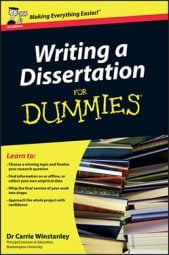The Internet is both the best and the worst resource available to you for researching your dissertation. What’s great about the Internet is the incredible array of information. What’s worst about the Internet is that there’s no system in place for monitoring or testing if the information is reliable.
It’s up to you, as well as being time-consuming, to judge the information you’re being presented with for relevance, usefulness, quality writing, or if the information is just plain wrong.
Dissertation tip: How to find academic info online
If your dissertation topic links to a module or course you’ve already taken, your tutor or supervisor very likely recommended Internet sites that have been tried and tested by the academic staff.
Unfortunately, Internet sites aren’t all created equal, and some are more suitable for academic research than others. Google, for example has a related site, called Google Scholar that restricts websites to academic sites rather than to commercial sites. The quality of the information on the academic sites isn’t guaranteed, but Google Scholar reduces the amount of dross you trawl through and cuts out irritating irrelevancies such as price comparison and auction sites.
Intute is another useful website and other websites exist that are specific to different fields. Click here for directions to these other sites. Before starting to use a website for your research ask your university librarian and supervisor for advice on the usefulness of the site.
Dissertation tip: Judging the quality of a website
Weighing up whether a website is reliable and likely to be useful in your research can be tricky. Take a look at the following organisations to judge if the information they handle is likely to help you in your research:
Government department websites: Useful for hard facts, not so great on analysis. The different government department websites display a great deal of data, statistics, and other information, presented in a way that tries to be objective.
But you also need to remember that the Government is trying to present a positive image and is unlikely to indulge in significant criticism of its own policies. Government sites are extremely useful for up-to-date information about current strategies but not very useful when it comes to evaluating initiatives.
University websites: Cutting-edge or at least up to date, but may be rather too narrow in focus. Just about all universities have research centres specialising in particular academic fields. Some aspects of university research programmes are available to the public through the Internet, whereas other research programmes are only open to members of the university. Most of the material on a university website is reliable, having been scrutinised by other experts in the field.
Non-governmental organisation (NGOs) websites: Offer useful analysis and criticism of government policies but you need to be clear about an NGO’s agenda.
Independent organisations websites: Particularly useful for evaluating government strategy and policies in general. Beware! Some organisations have a particular axe to grind and so criticism can lack balance or fairness. You may have already been given a list of relevant independent organisations useful for your research by your tutor or supervisor, or you’ve come across independent organisations in your reading.
Single-authored websites: Can be brilliant, can be dire! The quality of a site where there’s a single author is entirely dependent on that author. If the author is a known expert in your field, you’re likely to be onto a good thing. However, if you’ve never heard of the person before, how do you know that the author has any more knowledge than you?
News reports (newspapers and TV) websites: Watch out for bias. Never rely on a news report being accurate. You need to check out what you’ve found with other academic research that’s being done. If however, you just want to summarise popular opinion, or show examples of bias, websites reporting the news are perfect for these purposes.
Dissertation tip: Using the Internet wisely
Restricting your Internet searches to websites that are likely to be of reasonable quality (rather than any old website) is a good start, but it's up to you to test if what you're reading on the Internet is reliable enough for your research. You need information that’s presented neutrally from a dependable source that can stand up under scrutiny. When you’re looking at website ask yourself:
How credible is the source? Do you recognise the organisation, authors, background or other particulars?
How neutral is the source? If the information isn’t completely objective, is the subjectivity presented in a transparent or clear manner? Is there a reasonable explanation for the information being subjective?
How up-to-date is the website and when was it last updated? Are the links on the web page still functioning?
How applicable is the information? Is the website too general or too specific? The website may be designed to meet a very different need from yours, such as a particular case study that’s only relevant in a small number of cases.
What claims does the website make? If the suggestions are entirely bizarre and eccentric, are they going to be relevant to your research? A website that’s makes reference to similar authors and ideas and doesn’t leap out at you as being seriously peculiar may prove useful.
When you’re viewing a website remember to keep your critical wits about you!
Dissertation tip: Wikiworlds, or everyone can’t be wrong, can they?
Wiki websites, written by non-experts, grow daily in number. Wiki websites are great for the democratisation of information that allows everyone to have their say – but the concern among many academics is about the number of inaccuracies on so many Internet sites.
Because a lot of Internet sites escape any sort of monitoring, errors slip through unchecked and undetected – something that’s never allowed to happen when journals and books are being prepared for publication.

